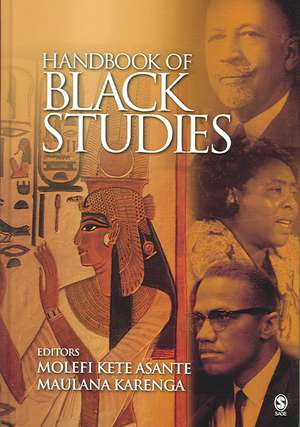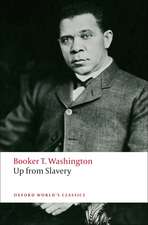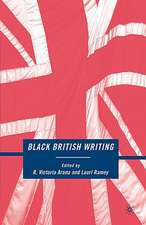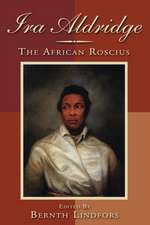Handbook of Black Studies
Autor Molefi Kete Asante, Maulana Karengaen Limba Engleză Hardback – feb 2006
The Editors are two of the most prominent scholars in the field with high name recognition.
The Excellent 3-Part organization brings the latest conceptual and analytical thinking into focus.
Preț: 1077.29 lei
Preț vechi: 1183.83 lei
-9% Nou
Puncte Express: 1616
Preț estimativ în valută:
206.16€ • 213.93$ • 172.32£
206.16€ • 213.93$ • 172.32£
Carte tipărită la comandă
Livrare economică 17-31 martie
Preluare comenzi: 021 569.72.76
Specificații
ISBN-13: 9780761928409
ISBN-10: 0761928405
Pagini: 472
Dimensiuni: 178 x 254 x 30 mm
Greutate: 0.99 kg
Ediția:1
Editura: SAGE Publications
Colecția Sage Publications, Inc
Locul publicării:Thousand Oaks, United States
ISBN-10: 0761928405
Pagini: 472
Dimensiuni: 178 x 254 x 30 mm
Greutate: 0.99 kg
Ediția:1
Editura: SAGE Publications
Colecția Sage Publications, Inc
Locul publicării:Thousand Oaks, United States
Cuprins
Preface - Molefi Kete Asante and Maulana Karenga
PART I: Historical and Cultural Foundations
The Intellectual Basis of the Black Studies Discourse
Interdisciplinary, Transdisciplinary or Unidisciplinary: Africana Studies and the Vexing Question of Definition - Ama Mazama
Black to the Future: Black Studies and Network Nommo - Norman Harris
Impact and Significance in the Academy
African Communication Patterns and the Black Studies Inheritance - Charles Okigbo
Women in the Development of Africana Studies - Delores P. Aldridge
Theorizing in Black Studies
Afrocentricity and Racial Socialization Among African American College Students - P. Masila Mutisya and Louie E. Ross
Philosophy and Practice for Black Studies: The Case of Researching White Supremacy - Mark Christian
Researching the Lives of the Enslaved: The State of the Scholarship - Katherine Olukemi Bankole
Antiracism: Theorizing in the Context of Perils and Desires - George J. Sefa Dei
PART II. Philosophical and Practical Bases
Reflection and Knowledge
Graduate Studies Programs in African American Studies - Ama Mazama
Africana Critical Theory of Contemporary Society: The Role of Radical Politics, Social Theory, and Africana Philosophy - Reiland Rabaka
Afrocentricity: Notes on a Disciplinary Position - Molefi Kete Asante
Black Studies, Social Transformation and Education
Revisiting Brown, Reaffirming Black: Reflections on Race, Law and Struggle - Maulana Karenga
African American Politics: The Black Studies Perspective - Charles P. Henry
Black Studies in the Historically Black Colleges and Universities - Daryl Zizwe Poe
African American Studies Programs in North America and the Teaching of Africa: Myth, Reality, and Reconstruction - Emmanuel Ngwainmbi
An African Nationalist Ideology in Diaspora and the Development Quagmire: Political Implications - Cecil Blake
PART III. Critical and Analytical Measures
Analytical Methods
The Canons of Afrocentric Research - Ruth Reviere
Africana Studies and the Problems in Egyptology: The Case of Ancient Egyptian Kinship - Troy Allen
The Context of Agency: Liberating African Consciousness From Postcolonial Discourse Theory - Virgilette Nzingha Gaffin
Kilombismo: An African Brazilian Orientation to Africology - Elisa Larkin Nascimento
Black Studies and the Social Work Paradigm: Implications of a New Analysis - Mekada Graham
The Pursuit of Africology: On the Creation and Sustaining of Black Studies - Molefi Kete Asante
Data Collection and Reporting
The Interview Technique as Oral History in Black Studies - Diane D. Turner
Decapitated and Lynched Forms: Suggested Ways of Examining Contemporary Texts - Willie Cannon-Brown
Film as Historical Method in Black Studies: Documenting the African Experience - Adeniyi Coker
PART IV. The Future of the Field
Sciences, Agency, and the Discipline
Social Discourse Without Abandoning African Agency: An Eshuean Response to Intellectual Dilemma - Molefi Kete Asante
Social Science and Systematic Inquiry in Africana Studies: Challenges for the 21st Century - James B. Stewart
The Field, Function and Future of Africana Studies: Critical Reflections on Its Mission, Meaning and Methodology - Maulana Karenga
Appendix. The Naming of the Discipline: The Unsettled Discourse
Index
About the Editors and Contributors
PART I: Historical and Cultural Foundations
The Intellectual Basis of the Black Studies Discourse
Interdisciplinary, Transdisciplinary or Unidisciplinary: Africana Studies and the Vexing Question of Definition - Ama Mazama
Black to the Future: Black Studies and Network Nommo - Norman Harris
Impact and Significance in the Academy
African Communication Patterns and the Black Studies Inheritance - Charles Okigbo
Women in the Development of Africana Studies - Delores P. Aldridge
Theorizing in Black Studies
Afrocentricity and Racial Socialization Among African American College Students - P. Masila Mutisya and Louie E. Ross
Philosophy and Practice for Black Studies: The Case of Researching White Supremacy - Mark Christian
Researching the Lives of the Enslaved: The State of the Scholarship - Katherine Olukemi Bankole
Antiracism: Theorizing in the Context of Perils and Desires - George J. Sefa Dei
PART II. Philosophical and Practical Bases
Reflection and Knowledge
Graduate Studies Programs in African American Studies - Ama Mazama
Africana Critical Theory of Contemporary Society: The Role of Radical Politics, Social Theory, and Africana Philosophy - Reiland Rabaka
Afrocentricity: Notes on a Disciplinary Position - Molefi Kete Asante
Black Studies, Social Transformation and Education
Revisiting Brown, Reaffirming Black: Reflections on Race, Law and Struggle - Maulana Karenga
African American Politics: The Black Studies Perspective - Charles P. Henry
Black Studies in the Historically Black Colleges and Universities - Daryl Zizwe Poe
African American Studies Programs in North America and the Teaching of Africa: Myth, Reality, and Reconstruction - Emmanuel Ngwainmbi
An African Nationalist Ideology in Diaspora and the Development Quagmire: Political Implications - Cecil Blake
PART III. Critical and Analytical Measures
Analytical Methods
The Canons of Afrocentric Research - Ruth Reviere
Africana Studies and the Problems in Egyptology: The Case of Ancient Egyptian Kinship - Troy Allen
The Context of Agency: Liberating African Consciousness From Postcolonial Discourse Theory - Virgilette Nzingha Gaffin
Kilombismo: An African Brazilian Orientation to Africology - Elisa Larkin Nascimento
Black Studies and the Social Work Paradigm: Implications of a New Analysis - Mekada Graham
The Pursuit of Africology: On the Creation and Sustaining of Black Studies - Molefi Kete Asante
Data Collection and Reporting
The Interview Technique as Oral History in Black Studies - Diane D. Turner
Decapitated and Lynched Forms: Suggested Ways of Examining Contemporary Texts - Willie Cannon-Brown
Film as Historical Method in Black Studies: Documenting the African Experience - Adeniyi Coker
PART IV. The Future of the Field
Sciences, Agency, and the Discipline
Social Discourse Without Abandoning African Agency: An Eshuean Response to Intellectual Dilemma - Molefi Kete Asante
Social Science and Systematic Inquiry in Africana Studies: Challenges for the 21st Century - James B. Stewart
The Field, Function and Future of Africana Studies: Critical Reflections on Its Mission, Meaning and Methodology - Maulana Karenga
Appendix. The Naming of the Discipline: The Unsettled Discourse
Index
About the Editors and Contributors
Notă biografică
Molefi Asante is a distinguished scholar and is best known for creating the discipline of Black Studies over 25 years ago. He is the Editor for the Journal of Black Studies (Sage) and the Encyclopedia of Black Studies (Sage Reference, 12/04 933 units, $82k LTD). His recent research has centered on the history and present developments of African religions.
Descriere
The Handbook of Black Studies is the first resource to bring together research and scholarship in the field of African-American studies in one volume. Editors Molefi Kete Asante and Maulana Karenga, along with a pre-eminent group of contributors, examine various aspects of the field of Black Studies. Organized into three parts, this Handbook explores historical and cultural foundations, philosophical and conceptual bases, and critical and analytical concepts.
















